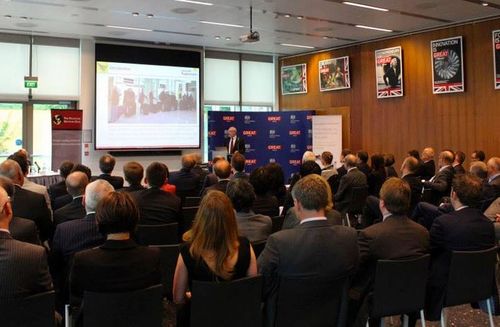
I remember in one of our early Financial Services Club meetings,
a member of the UK Government’s Treasury Select Committee asking our attentive
throng: can any of you explain APR to me?
Not a single person in the room raised a hand. This is either because no-one wanted to answer
the question or no-one could.
I suspect the latter as APR is still a complex area, made more
complex by regulations.
In the UK for
example, banks and credit card companies have to show their total charges, inclusive
of all fees. This is why some cards are
17.9% APR whilst others are 42.9%, as the latter may have a £20 per year fee for
superior service – such as a waiver for late payment – whilst the former does
not. The latter may actually charge
9.9% interest on purchases, but that does not matter as the fee is what bumps
up the percentage rate to 42.9%.
Then there are firms like Wonga, presenting at the Financial
Services Club on 27th June,
who supposedly charge 4000% or more. Of
course they do! That’s because you’re
not supposed to use Wonga for a year – an ANNUAL percentage rate – you’re supposed
to use them for a few days. That’s why
it’s a payday loan company and not a payyear loan company.
Whatever.
This issue of rates and fees came to light again last week
however, as we had our second Financial Services Club meeting in Warsaw,
Poland.
This meeting was headlined: “the future landscape for cash and payments”, with David Birch from Consult Hyperion giving the opening keynote on
the future of mobile wallets and money.

That was all fairly innocuous stuff as it turned out, even though
Dave can be quite controversial claiming that people ‘hate you’ (bankers in the
audience) but love retailers, and that it’s retailers like Starbucks and Hailo
who are changing the payments game.
This is because retailers are looking at what you buy, rather
than what you are paying for. So
Starbucks focus upon the total retail coffee experience and make it easy for
you to get that double macchiato with an extra shot, skinny, without even thinking
about the fact that you are paying $5 for it.
Hailo does the
same for taxi’s: forget the change, focus upon the experience and ease of
service.
I agreed with all this, and it’s a proven model that anyone
who removes friction from the process, particularly friction from the payments process,
will win business.
This is why retailers are making apps that make it easy to
pay, as it increases usage of their app and therefore business increases by decreasing the problem of how to
pay.
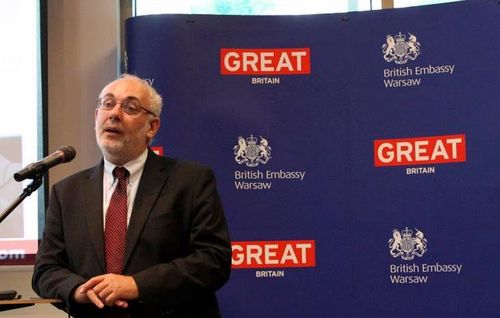
However, as someone else pointed out, this creates an
opportunity for banks to aggregate friction free retail experiences.
How so?
By avoiding everyone having to carry thirty or forty
separate retail apps, with different interfaces, and bringing them all into
one.
Sounds like a plan.
David was followed by Jakub Górka, who I thought would give
a response based upon the localised Poland experience of contactless payments.
Jakub is an Assistant Professor at the University of Warsaw,
who has produced various papers outlining Poland’s innovations and moves
towards electronic and contactless payments.
Therefore, I was surprised to be told that it was quite a
controversial choice to have selected Jakub to present.
How so?
Well apparently Poland is drafting new regulations for
credit and debit card charges, and Jakub Górka has been an instrumental player
in the drafting of the political views about what is and is not acceptable.
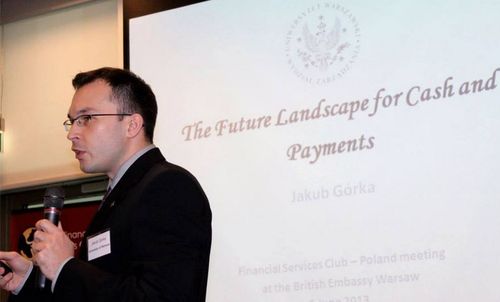
As Jakub presented, there was therefore a sense of palpable
concern when he made it clear that Poland may be innovating with contactless
payments but the fees on cards is blocking the move from cash to electronic.
In fact, as the chart below shows, Poland has some of the
highest interchange fees of any European country:
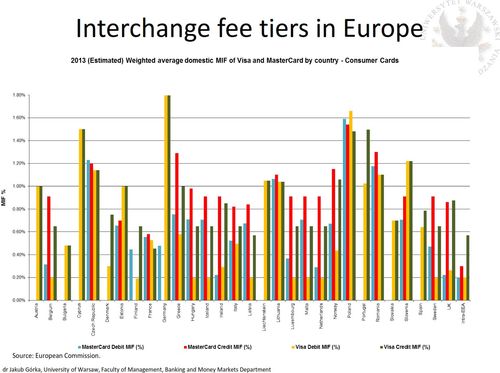
At the end of his presentation, Jakub was challenged over
some of the ways in which his analysis had been calculated however, particularly
the usage of the Merchant Indifference Test (MIT)*.
According to this analysis, picked up by the Polish
government, interchange fees should not be more than 0.2% but were running as high as 1,55% in 2012 (the weighted average between Visa and MasterCard
consumer cards).
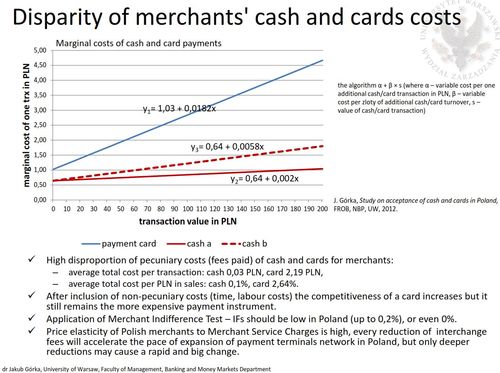
Unsurprisingly, this caused issue with the banks who claim that
MIT does not take into account the financial processes, the counterparties involved,
the fraud and risk management systems that are used to manage card payments and
the overall constituency involved in the card system.
After all, MIT purely looks at what merchants are willing to
pay and most merchants want or expect to pay nothing.
It will be interesting to see how this debate turns out but
it was quite a ding-dong debate regardless.
Watch this space.
* The 'merchant indifference methodology' or 'tourist
test' is based upon an interchange fee that is set at such a level that the
merchant is indifferent as to whether they receive a card or cash payment, and
is being used as the standard for interchange fee rate setting caps by the
European Commission.
Note: Dave Birch is not a fan of the MIT: Forget the “merchant
indifference test” and get on with eliminating cash (Dave also wrote a lovely blog about the Polish meeting too).
Other relevant articles include:
- Poles still paying
highest interchange fees in Europe,
Warsaw Business Journal, March 2012 - Visa Europe Offers to
Cap Credit-Card Fees to End EU Probe,
Bloomberg, May 2013 - EU considers new
interchange fees regulations,
Smart Insights, May 2013
And checkout the meeting in photo form over on our Facebook Page.
Chris M Skinner
Chris Skinner is best known as an independent commentator on the financial markets through his blog, TheFinanser.com, as author of the bestselling book Digital Bank, and Chair of the European networking forum the Financial Services Club. He has been voted one of the most influential people in banking by The Financial Brand (as well as one of the best blogs), a FinTech Titan (Next Bank), one of the Fintech Leaders you need to follow (City AM, Deluxe and Jax Finance), as well as one of the Top 40 most influential people in financial technology by the Wall Street Journal's Financial News. To learn more click here...

